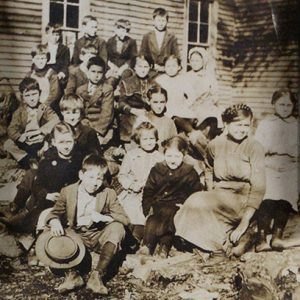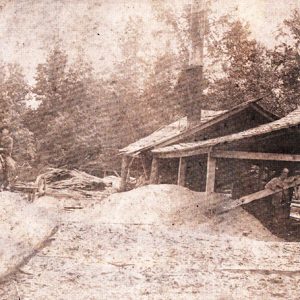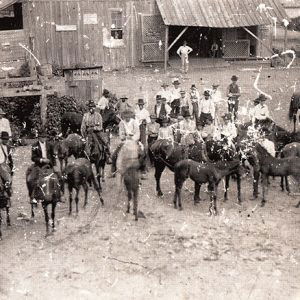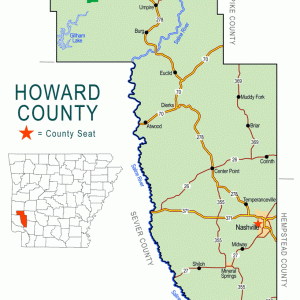calsfoundation@cals.org
Corinth (Howard County)
Corinth, named for the local Church of Christ, was originally known as Wilton Settlement. The unincorporated community in Brewer Township in Howard County has always been an agricultural area. Since the first recorded wave of settlement in 1845, the community has lost population, and in 2009 the residents numbered seventy.
Caddo Indians inhabited the area in the sixteenth century, but they had been removed to Oklahoma by the mid-1800s. A land exchange with the Choctaw in the 1820s brought more Native American settlement, which made white migrants wary of moving to the area for a time.
By the 1840s, Indian Removal cleared the way for white migrants heading west, and numerous families made the area, then in Pike County, their home. Several elements made the present-day area of Corinth attractive to settlement. Improved transportation provided by the Military Road allowed families from the east access to good pastureland and reliable water sources. A spring at Wilton Settlement contributed to the growth of the community. Once Howard County was created in 1873, the county seat at Center Point, six miles to the west, allowed settlers to conduct business with relative ease. Residents were still within a day’s travel to the political and business center of the county when the seat was moved to Nashville (Howard County) in 1905.
The first recorded white settlers, David Dickens Jones and Jordan Reese from Tennessee, settled in Wilton in 1845. They wrote home about the opportunities, and by 1850, there were approximately forty families from the east in the county. The Wilton post office was established in 1857, and a small commercial center with general stores, a gin, a sawmill, and a grist mill resulted. The Corinth Church of Christ was organized by 1850 and was the inspiration for the new name of the community in 1885.
The first public school in Corinth was a log structure in 1862. The school moved to several structures over the years and was closed in 1939. Corinth was also home to Nazareth University, a Christian college founded by Texan Colin McKinney Wilmeth in 1890. The college offered four departments—Biblical, Classical, Industrial, and Musical—and published a weekly newspaper called the Watchman. Nazareth University boosted the population of Corinth by 200 until the Depression of 1893. This resulted in the closure of the university in 1897.
Corinth never experienced a large population growth again. The post office closed in 1912, and the community remained a rural residential and farming stop on the Military Road. By the early twentieth century, Howard County began producing Elberta peaches. The Highland Orchard introduced the crop to the area around Corinth, and the majority of the original farms were converted to orchards. Many residents sold their land and moved, to be replaced by transient workers. The Great Depression, late freezes, the movement of brokers to other states, and declining cotton production in the 1950s hindered sustained expansion of Corinth.
In the twenty-first century, the community consists of scattered residences, cattle farms, and three cemeteries. The nearby towns of Nashville, Camden (Ouachita County), and Hope (Hempstead County) meet the commercial and governmental needs of residents, so there has not been any activity beyond agricultural development since the cotton crops failed.
For additional information:
Hope, Holly. “Old Corinth Cemetery.” National Register of Historic Places nomination form, 2011. On file at Arkansas Historic Preservation Program, Little Rock, Arkansas.
Howard County Heritage Club. The History of Howard County, Arkansas, 1873–1973. Nashville, AR: Nashville News, 1973.
Westbrook, Lucille. Corinth Revisited by Its Kinfolks. N.p.: 1977.
Holly Hope
Arkansas Historic Preservation Program








Comments
No comments on this entry yet.